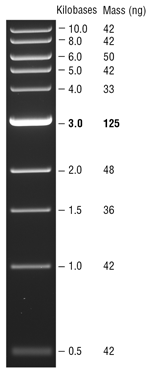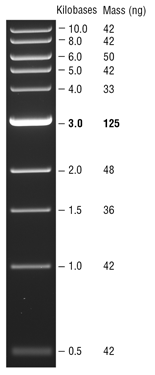1 kb DNA Ladder
Product information| Code | Name | Size | Quantity | Price | |
|---|---|---|---|---|---|
N3232S |
DNA Ladder 1 kb |
100 ug ( 500 µg/ml ) | - | Unavailable in your region | |
N3232L |
DNA Ladder 1 kb |
500 ug ( 500 µg/ml ) | - | Unavailable in your region |
1 kb DNA Ladder
This product is available in Quick-Load Purple format - enjoy the convenience of a ready-to-load format.
Product Introduction
- Size range: 500 bp to 10 kb
- Value pricing
- Supplied with free vial of Gel Loading Dye, Purple (6X), no SDS (NEB #B7025).
- Easy to identify reference bands
- Small size suitable for 200 gel lanes; large size suitable for 1000 gel lanes

| Catalog # | Size | Concentration |
|---|---|---|
| N3232S | 200 gel lanes (0.2 ml) | 500 µg/ml |
| N3232L | 1000 gel lanes (1.0 ml) | 500 µg/ml |
- Product Information
- Protocols, Manuals & Usage
- Tools & Resources
- FAQs & Troubleshooting
- Citations & Technical Literature
- Quality, Safety & Legal
- Other Products You May Be Interested In
Product Information
Description
A number of proprietary plasmids are digested to completion with appropriate restriction enzymes to yield 10 bands suitable for use as molecular weight standards for agarose gel electrophoresis. The digested DNA includes fragments ranging from 0.5-10.0 kilobases (kb). The 3.0 kb fragment has increased intensity to serve as a reference band. The approximate mass of DNA in each of the bands is provided (assuming a 0.5 μg load) for approximating the mass of DNA in comparably intense samples of similar size.
Comes supplied with 1 vial of Gel Loading Dye, Purple (6X), no SDS.
NEB also offers a Quick-Load version of this ladder with purple dye.
- Recommended gel percentage range: 0.8-1.2%
- Optimum separation on 1%

- This product is related to the following categories:
- DNA Markers & Ladders
- This product can be used in the following applications:
- DNA Analysis
Reagents Supplied
Reagents Supplied
The following reagents are supplied with this product:
| NEB # | Component Name | Component # | Stored at (°C) | Amount | Concentration | |||||||||||||||||||
|---|---|---|---|---|---|---|---|---|---|---|---|---|---|---|---|---|---|---|---|---|---|---|---|---|
| ||||||||||||||||||||||||
| ||||||||||||||||||||||||
Properties & Usage
Bases
| Fragment | Mass (ng) | bp |
|---|---|---|
| 1 | 42 | 10,002 |
| 2 | 42 | 8,001 |
| 3 | 50 | 6,001 |
| 4 | 42 | 5,001 |
| 5 | 33 | 4,001 |
| 6 | 125 | 3,001 |
| 7 | 48 | 2,000 |
| 8 | 36 | 1,500 |
| 9 | 42 | 1,000 |
| 10a | 21 | 517 |
| 10b | 21 | 500 |
Effective Size Range
500bp to 10,002bpStorage Buffer
10 mM Tris-HCl
1 mM EDTA
pH 8 @ 25°C
Related Products
Companion Products
- 100 bp DNA Ladder
- 50 bp DNA Ladder
- PCR Marker
- Quick-Load® 1 kb DNA Ladder
- Quick-Load® 100 bp DNA Ladder
- Quick-Load® 1 kb Plus DNA Ladder
- TriDye™ 1 kb DNA Ladder
- TriDye™ 100 bp DNA Ladder
- TriDye™ 1 kb Plus DNA Ladder
- Gel Loading Dye, Purple (6X), no SDS
Materials Sold Separately
Product Notes
- This ladder was not designed for precise quantification of DNA mass but can be used for approximating the mass of DNA in comparably intense samples of similar size.
- We recommend loading 0.5 μg of 1 kb DNA Ladder diluted in sample buffer.
- All fragments have a 4-base, 5´ overhangs that can be end labeled using T4 Polynucleotide Kinase (#M0201) or filled-in using DNA Polymerase I, Klenow Fragment (#M0210) (1). Use α-[32P] dATP or α-[32P] dTTP for the fill-in reaction.
- 1 kb DNA Ladder is stable for at least 3 months at 4°C.
- For long term storage, store at -20°C. If samples need to be diluted, use TE or other buffer of minimal ionic strength. DNA may denature if diluted in dH20.
- 1X Gel Loading Dye, Purple (6X), no SDS:
2.5% Ficoll®-400
10mM EDTA
3.3mM Tris-HCL (pH 8.0@25°C)
0.02% Dye 1
0.001% Dye 2 - Due to the limitations of the acrylamide gel technology, one or two extra bands may be visible on the DNA ladders when run on a polyacrylamide gel.
References
- Sambrook, J., Fritsch, E.F. and Maniatis, T. (1989). Molecular Cloning: A Laboratory Manual(2nd Ed.). 10.51-10.67.
Protocols, Manuals & Usage
Protocols
Tools & Resources
Selection Charts
FAQs & Troubleshooting
FAQs
- Why are there extra bands visible on polyacrylamide gels?
- What are the overhangs on the DNA ladder fragments? Can I end-label them using the T4 polynucleotide kinase (PNK)? What about the Klenow fragment?
- Why are the DNA ladders showing up on my Southern blot? What is the sequence or composition of the ladder bands?
- How can I quantify the amount of DNA in each band of a marker?
- Can I use Midori Green with the DNA Ladders from NEB?
- Can I use SYBR® and/or GelRed® dyes with the DNA Ladders from NEB?
- Why is my DNA Ladder floating out the wells? Why are there no bands visible in my DNA ladder gel lane?
Tech Tips
To make it ready-to-load, dilute in TE buffer instead of water.
Citations & Technical Literature
Citations
Additional Citations
Quality, Safety & Legal
Quality Assurance Statement
Quality Control tests are performed on each new lot of NEB product to meet the specifications designated for it. Specifications and individual lot data from the tests that are performed for this particular product can be found and downloaded on the Product Specification Sheet, Certificate of Analysis, data card or product manual. Further information regarding NEB product quality can be found here.Specifications
The Specification sheet is a document that includes the storage temperature, shelf life and the specifications designated for the product. The following file naming structure is used to name these document files: [Product Number]_[Size]_[Version]Certificate Of Analysis
The Certificate of Analysis (COA) is a signed document that includes the storage temperature, expiration date and quality controls for an individual lot. The following file naming structure is used to name these document files: [Product Number]_[Size]_[Version]_[Lot Number]- N3232S_L_v1_1191401
- N3232S_L_v1_1201403
- N3232S_L_v1_1211404
- N3232S_L_v1_1221406
- N3232S_L_v1_1241409
- N3232S_L_v1_1231408
- N3232S_L_v1_1261501
- N3232S_L_v1_1271502
- N3232S_L_v1_1281504
- N3232S_L_v1_1251411
- N3232S_L_v1_1291506
- N3232S_L_v1_1301508
- N3232S_L_v1_1311509
- N3232S_L_v1_1321511
- N3232S_L_v1_1331512
- N3232S_L_v1_1341601
- N3232S_L_v1_1351603
- N3232S_L_v1_1361605
- N3232S_L_v1_1371607
- N3232S_L_v1_1381610
- N3232S_L_v1_1391612
- N3232S_L_v1_1401701
- N3232S_L_v1_1411704
- N3232S_L_v1_1421704
- N3232S_L_v1_1431707
- N3232S_L_v1_1441709
- N3232S_L_v1_1451711
- N3232S_L_v1_1461712
- N3232S_L_v1_1481803
- N3232S_L_v1_1471803
- N3232S_v1_10011837
- N3232L_v1_10012420
- N3232S_v1_10012422
- N3232L_v1_10019548
- N3232S_v1_10023272
- N3232L_v1_10027017
- N3232S_v1_10027019
- N3232L_v1_10033518
- N3232S_v1_10033520
- N3232L_v1_10039032
- N3232S_v1_10037289
- N3232S_v1_10040171
- N3232L_v1_10046572
- N3232S_v1_10046585
- N3232L_v1_10050628
- N3232S_v1_10050629
- N3232S_v1_10055445
- N3232S_v1_10057926
- N3232L_v1_10057308
- N3232S_v1_10061248
- N3232L_v1_10063212
- N3232S_v1_10064805
- N3232S_v1_10068088
- N3232L_v1_10068090
- N3232S_v1_10073727
- N3232S_v1_10081650
- N3232L_v1_10081824
- N3232S_v1_10083178
- N3232S_v1_10086296
- N3232L_v1_10089570
- N3232S_v1_10091549
- N3232S_v1_10097105
- N3232L_v1_10097108
- N3232S_v1_10107036
- N3232S_v1_10110880
- N3232S_v1_10114821
- N3232L_v1_10114820
- N3232S_v1_10122651
- N3232S_v1_10126733
- N3232L_v1_10126735
- N3232S_v1_10136968
- N3232L_v1_10140867
- N3232S_v1_10143748
- N3232L_v1_10150172
- N3232S_v1_10150173
- N3232S_v1_10158581
- N3232L_v1_10161908
- N3232S_v1_10161906
- N3232S_v1_10171417
- N3232L_v1_10176067
- N3232L_v1_10182381
- N3232S_v1_10182565
- N3232S_v1_10191057
- N3232L_v1_10204902
- N3232S_v1_10204903
- N3232S_v1_10214065
- N3232S_v1_10222514
- N3232S_v1_10231436
- N3232L_v1_10231466
- N3232S_v1_10235829
- N3232S_v1_10247929
- N3232L_v1_10256215
- N3232S_v1_10256214
- N3232S_v1_10262169
- N3232S_v1_10273758
- N3232S_v1_10278630
- N3232L_v1_10281423
- N3232S_v1_10290575
- N3232S_v1_10303488
Safety DataSheets
The following is a list of Safety Data Sheet (SDS) that apply to this product to help you use it safely.1 kb DNA Ladder
Gel Loading Dye, Purple (6X), no SDS
Legal and Disclaimers
Products and content are covered by one or more patents, trademarks and/or copyrights owned or controlled by New England Biolabs, Inc (NEB). The use of trademark symbols does not necessarily indicate that the name is trademarked in the country where it is being read; it indicates where the content was originally developed. The use of this product may require the buyer to obtain additional third-party intellectual property rights for certain applications. For more information, please email busdev@neb.com.This product is intended for research purposes only. This product is not intended to be used for therapeutic or diagnostic purposes in humans or animals.
New England Biolabs (NEB) is committed to practicing ethical science – we believe it is our job as researchers to ask the important questions that when answered will help preserve our quality of life and the world that we live in. However, this research should always be done in safe and ethical manner. Learn more.
Other Products You May Be Interested In
The supporting documents available for this product can be downloaded below.


